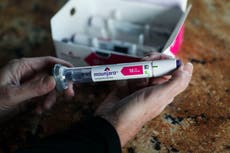Scientists reveal how to spot first signs of dementia nine years before diagnosis
Early intervention could reduce your risk of developing dementia-related disease
Your support helps us to tell the story
From reproductive rights to climate change to Big Tech, The Independent is on the ground when the story is developing. Whether it's investigating the financials of Elon Musk's pro-Trump PAC or producing our latest documentary, 'The A Word', which shines a light on the American women fighting for reproductive rights, we know how important it is to parse out the facts from the messaging.
At such a critical moment in US history, we need reporters on the ground. Your donation allows us to keep sending journalists to speak to both sides of the story.
The Independent is trusted by Americans across the entire political spectrum. And unlike many other quality news outlets, we choose not to lock Americans out of our reporting and analysis with paywalls. We believe quality journalism should be available to everyone, paid for by those who can afford it.
Your support makes all the difference.It could be possible to spot signs of dementia up to nine years before diagnosis, a new study has found.
The findings, published in Alzheimer’s & Dementia: The Journal of the Alzheimer’s Association, mean that future at-risk patients could be screened to help identify those who might benefit from early interventions to reduce their risk of developing dementia-related diseases.
They could also help select those suitable for clinical trials for new treatments.
“When we looked back at patients’ histories, it became clear that they were showing some cognitive impairment several years before their symptoms became obvious enough to prompt a diagnosis,” study author Nol Swaddiwudhipong, a junior doctor at the University of Cambridge, said.
“The impairments were often subtle, but across a number of aspects of cognition. This is a step towards us being able to screen people who are at greatest risk - for example, people over 50 or those who have high blood pressure or do not do enough exercise - and intervene at an earlier stage to help them reduce their risk.”
For the study, researchers analysed data from the UK Biobank database and pinpointed problem solving and number recall as two of the early signs patients could develop dementia.
Senior author Dr Tim Rittman, also from the University of Cambridge, said: “People should not be unduly worried if, for example, they are not good at recalling numbers.
“Even some healthy individuals will naturally score better or worse than their peers. But we would encourage anyone who has any concerns or notices that their memory or recall is getting worse to speak to their GP.”
People from the UK Biobank data who went on to develop Alzheimer’s scored more poorly compared with healthy individuals when it came to problem solving tasks, reaction times, remembering lists of numbers, prospective memory (our ability to remember to do something later on) and pair matching.
This was also the case for people who developed a rarer form of dementia known as frontotemporal dementia, the researchers found.

According to the study, people who went on to develop Alzheimer’s were more likely than healthy adults to have had a fall in the previous 12 months.
David Thomas, head of policy at Alzheimer’s Research UK, said: “It is increasingly clear that the best chance to affect the course of the diseases which cause dementia lies in intervening at their earliest stages.
“Health services don’t routinely offer the tests needed to detect changes in brain function that happen before symptoms are noticeable, like those alluded to in this study.
“In fact, the NHS is currently unable to guarantee early and accurate diagnosis for people living with dementia - more than a third of people over 65 living with dementia go undiagnosed.
He added: “It’s now more important than ever that NHS services reflect our growing understanding of the importance of detection and early diagnosis.
“We must ensure that people with dementia don’t fall through the cracks at a time when treatment or risk-reduction interventions are most likely to be effective.”
Additional reporting by PA



Join our commenting forum
Join thought-provoking conversations, follow other Independent readers and see their replies
Comments